Chennai (Madras)
This city came with a bad 'rap' from Lonely Planet etc. So we were surprised to drive in along wide streets past pleasant parks and on our approach from the South, past engineering colleges; car plants; and salt farms; to see some of the tallest buildings in India.
Sure, there is still obvious poverty; and beggars and cows in the street. It has the fourth highest number of slum dwellers in India. But Chennai is a lot more like, relatively prosperous, Mumbai than Kolkata (Calcutta).
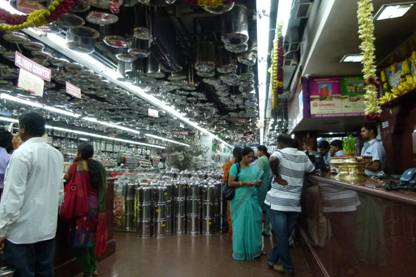
Even local shops in the market street are impressive.
As in much of India the electricity fails regularly but here even the smallest businesses have stand-by generators - making the streets even hotter than usual. As I have wondered elsewhere, does India accurately account for the fuel consumed by these units as fossil generation?
Recently economic growth in Chennai has been the fastest in India; based on growth in the automotive, rail, electronics and communications sectors. A number of social indicators have been correspondingly improving. For example most children now go to school; resulting in greatly improved literacy that is now much higher that in most of India; at around 90%.
It also has several Café Coffee Day franchises; by now our quick test of prosperity - like the number of Chinese restaurants in Australian Country towns.
Madras had its origins in the British East India Company. It grew up soon after the English defeated the Portuguese at the Battle of Swally in 1612. The first substantial fortified trading post or ‘factory’ was Fort St George, established by the Company in 1644. This was before similar factories were established in Bombay (Mumbai) in 1668, and Calcutta in 1690.
Although it became an important city in British India, the British East India Company was administered from Calcutta. So Madras lacks grand historic buildings from that period. It does however boast a handful of impressive Victorian buildings from the Raj, including the State Museum where we spent a happy hour or so.
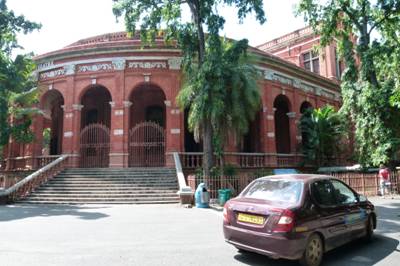
We gave full marks as the best presented and maintained museum that we have visited in India; if not the one with the largest collection.
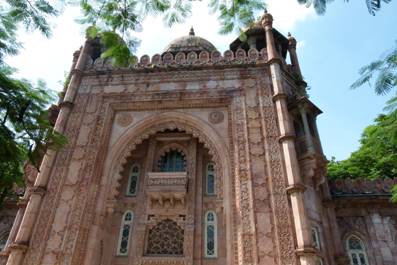
Despite the wide streets there is a terrible traffic problem, due mainly to the proliferation of late model cars. This is clearly a place where money is being made.
Our hotel was by far the best of the whole trip.
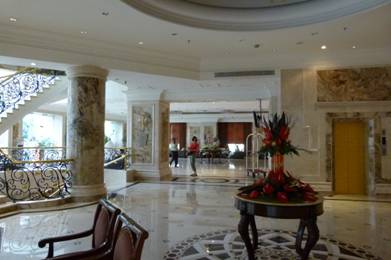
But there is not a lot to attract a tourist, except the prospect of a city that is fast developing with a new metro and many road projects under development; and a feeling that this is a part of India that may be keeping abreast of China; because most of the country is not.
Adjacent to the hotel is a Jain temple. I went in, removed my shoes, and looked around.
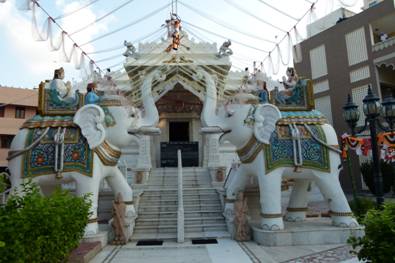
A man my height dressed in smart casual clothes with a little girl came up to me and asked what I thought of it. I asked if he was a Jain. He was. He then initiated a conversation about the sanctity of life.
He explained no living creatures should be killed, even an ant. I said I have a hierarchy when it comes to killing. I value humans above ants. He said Jains value all life equally.
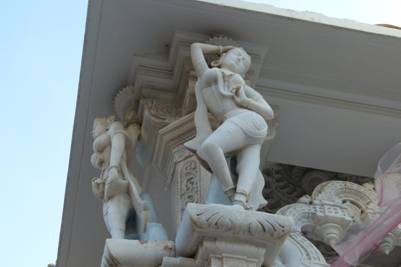
So I asked about plants. He explained that fruit and green vegetables are 'fair game'. As colonies of living cells they don’t count; you can kill and eat them. But some root vegetables mustn’t be eaten.
I asked why; when other colonies of cells containing similar proteins and DNA, for example cows, can’t be eaten. And isn’t a fruit or a seed equivalent to the foetus of a plant? Why are Jains discriminating?
I said that I value the right to choose what I eat. There is quite a bit of food I don’t like - this was close to my heart at the end of a trip to India. I accept that there may be good reasons for vegetarianism based on rational grounds, such as health or reducing one’s carbon footprint, but I don’t accept that religion has anything to do with that choice.
We begged to differ. So he told be that I was 'mired in sin' - a mire I was about to sink deeper into, as I had admitted that I planned to eat after sunset that evening. Thus mired I left to join Wendy for dinner.
As it happened we ate a lot of plant foetus and drank their fermented blood; no animals, except bacteria, were involved. Damn! I forgot to ask him if I could eat bacteria.
A serious problem here is the Tuck-Tuck drivers who take tourists to markets they don’t want to go to and blatantly lie about the place you have nominated as a destination saying it is closed or unsafe or anything to persuade you to allow them to go somewhere else. We have been travelling long enough not to agree to this.
Nevertheless one actually took us to a slum telling us it was the market Wendy had nominated. They all seem to do it. As soon as we had our bearings we paid close attention to the map and either walked or nominated somewhere nearby and insisted we didn’t care when advised it was unavailable. At least Kolkata has police attempting, not very sucessfully, to stop taxi rorts.
